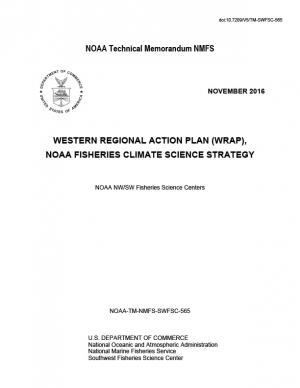Access a range of climate-related reports issued by government agencies and scientific organizations. Browse the reports listed below, or filter by scope, content, or focus in the boxes above. To expand your results, click the Clear Filters link.
The Western Regional Action Plan was developed to increase the production, delivery, and use of climate-related information to fulfill the NOAA Fisheries mission in the region, and identifies priority needs and specific actions to implement the NOAA Fisheries Climate Science Strategy in the West over the next three to five years. The California Current Large Marine Ecosystem (CCLME) spans the entire west coast of the continental U.S. and has significant seasonal, inter-annual, and inter-decadal fluctuations in climate that impact the marine food-web and fisheries. The CCLME is highly important economically and ecologically. Commercial and recreational fisheries in the CCLME contribute significantly to the U.S. economy, and a host of fish, bird, and mammal species depend on the productive waters and lipid-rich food web of the CCLME for their annual feeding migrations. Migrant species include several million metric tons of hake and sardine from the waters off southern California, several hundred million juvenile salmon from U.S. West Coast rivers, millions of seabirds from as far as New Zealand (sooty shearwaters) and Hawaii (Laysan and black-footed albatrosses), and tens of thousands of grey whales from Baja California and humpback whales from the Eastern North Pacific. These feeding migrations allow species to load up on energy reserves as an aid to survival during their winter months in southern extremes of their distribution. Climate-related physical processes that disrupt the CCLME ecosystem may result in negative impacts to U.S. fisheries, migrant species, and the people and communities that depend on these living marine resources.
In 1993, Portland was the first U.S. city to create a local action plan for cutting carbon. Portland’s Climate Action Plan is a strategy to put Portland and Multnomah County on a path to achieve a 40 percent reduction in carbon emissions by 2030 and an 80 percent reduction by 2050 (compared to 1990 levels). The 2015 Climate Action Plan builds on the accomplishments to date with ambitious new policies, fresh research on consumption choices, and engagement with community leaders serving low-income households and communities of color to advance equity through the City and County’s climate action efforts.
The Plan's goals include reducing community-wide greenhouse gas emissions 10 percent below 1990 levels by 2020, reducing community-wide fossil fuel use 50 percent by 2030, and identifying strategies that will help the community adapt to climate change and rising fuel prices
Ted Kulongoski, Governor of Oregon from 2003–2011, selected the Climate Change Integration Group (CCIG) to develop a framework for making informed decisions to minimize the more extreme impacts of climate change. Kulongoski wanted the CCIG to create a strategy for Oregon to apply the measures from the 2004 Oregon Strategy for Greenhouse Gas Reductions. In this report, the CCIG proposes that Oregon takes steps toward developing a framework that will assist individuals, businesses, and governments to incorporate climate change into their planning processes.
This document identifies goals and actions to conserve and restore Oregon’s species, habitats, and ecosystems. The report addresses climate change as a key conservation issue, and many of the recommendations provided consider adaptation measures to address species and habitat conservation needs. The 10-year revision of the Strategy and its Nearshore Component is currently under review by the U.S. Fish and Wildlife Service and will be posted at the provided URL once approved.







